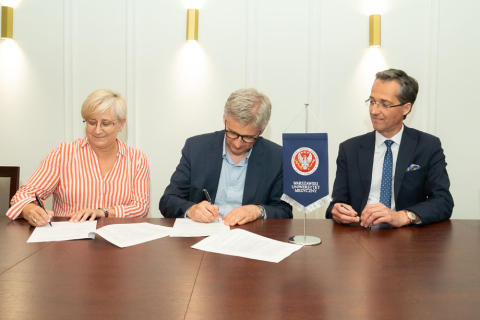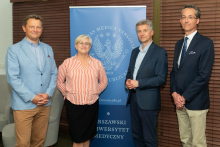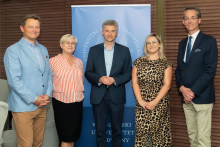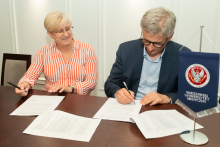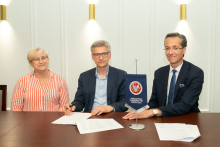On July 19, 2024, an agreement was signed between the Medical University of Warsaw and the Klementyna Hoffmanowa 9th Senior High School in Warsaw, the first high school that took an interest in this project financed by the Ministry of Science and Higher Education.
On the WUM side the agreement was signed by Prof. Piotr Pruszczyk, vice-rector for science and technology transfer, and Prof. Krzysztof Mucha, project manager. The Senior High was represented by its director, M.A. Joanna Kiełbasa.
The implementation is scheduled for the years 2024-2027. The head of the entire project is Prof. Krzysztof Mucha, the head of the center at the Medical University of Lublin is its rector, Prof. Wojciech Załuska, while the head of the center at the Medical University of Białystok is Prof. Beata Naumnik.
In addition to the above mentioned, the research team includes Prof. Leszek Pączek, Prof. Bartosz Foroncewicz, MD Natalia Krata, MD Moszczuk, MD Natalia Mikołajczyk-Korniak, MD Izabela Zakrocka, physicians, MD Anna Łabuś, Emilia Knioła, Anna Bieryło-Dołęgiewicz and Anna Szczykowska-Miller, nurse Sylwia Boczkowska and students Ryszard Radziukiewicz and Bartosz Naumnik.
The social importance of this project should be emphasized, as chronic kidney disease (CKD) affects 10% of the world’s population and is a significant health problem. Regardless of the stage of advancement, it increases the risk of cardiovascular diseases, deteriorates the quality of life, causes premature mortality and is a financial burden for the health care system.
Approximately 4 million people live with CKD in Poland. The initial symptoms of kidney disease are not specific and include hematuria or proteinuria which can be diagnosed by a general urine test. Early detection of CKD, especially abnormalities in general urinalysis, enables quick and effective intervention and improves treatment results and prognosis. A significant percentage of kidney diseases begin in adolescence (at approximately 15-19 years of age), which is why it is so important to identify persons with an abnormal result of a general urine test. This is especially important from the perspective of young people entering adult life.
The study will cover students of grades 3 and 4 of secondary schools from Warsaw, Lublin and Białystok – youth aged 18-19.
The main goal is education, prevention of kidney diseases and their earliest possible diagnosis among young people.
